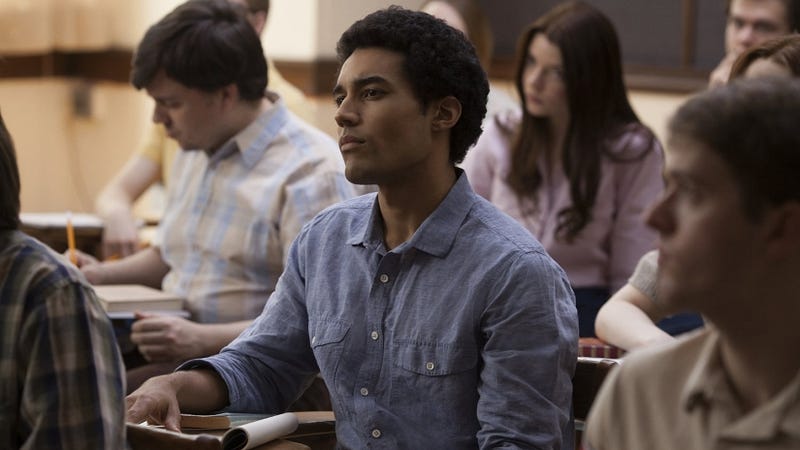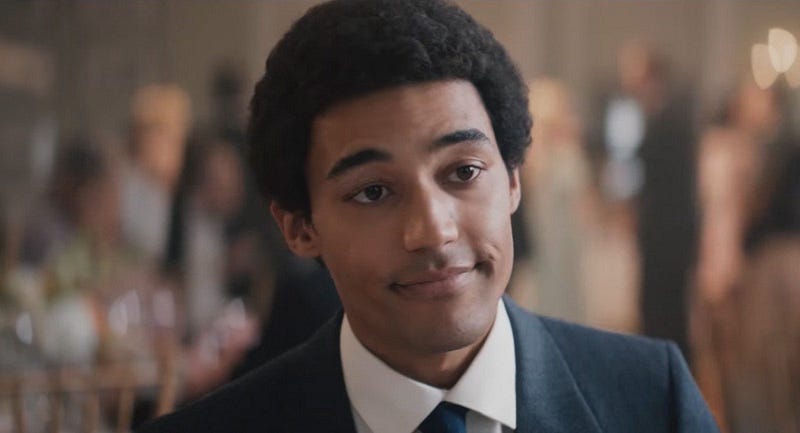
American history is fluid.
All history is fluid, but America as a nation has always been defined by the way we write and re-write our present and pasts, the way language and story are deployed to position an idea.
That holds especially true for presidencies, as films (fiction and non) form the narrative of an administration even as it is ongoing. George W. Bush hadn’t even left office before we got the release of W., satirizing and mocking the life and legacy of the 43rd president before he even left the White House.
Which brings us to Barack Obama. As opposed to the scathing indictments that awaited Dubya as he prepared to leave, Obama’s final year has seen the release of two different coming of age films. Southside with You takes a Before Sunrise/Sunset tact to follow Barack and Michelle on their first date.
Barry, released exclusively to Netflix, traces the early college days of “Barry” Obama, introduced chain-smoking on a plane and greeting his new New York City home with a muttered “shit”. The future president smokes, drinks, has sex with the star of The Witch, gets into racially charged arguments with his yuppie scum classmates and generally ponders what sort of person he wants to be as a bi-racial young man in America in 1981.
America is saying goodbye to President Obama today. Tomorrow, Citizen Obama arrives, leaving the man, and the nation, at the same crossroad that the younger Barry of Barry struggled to negotiate.
Did you get a chance to watch along with us this week? Want to recommend a great (or not so great) film for the whole gang to cover? Comment below or post on our Facebook or hit us up on Twitter!
Next Week’s Pick:
Terry Gilliam has always been something of a tortured genius, creating incredible works of great artistry but also having rotten luck. He’s known for battling studios and baffling audiences, but Lost In La Mancha takes a look at perhaps his most crushing defeat — the failure to create a long-time passion project, a Don Quixote film that was finally set into production but beset by problems. Catch it on Netflix and send us your thoughts!
Would you like to be a guest in next week’s Two Cents column? Simply watch and send your under-200-word review to twocents(at)cinapse.co!
Our Guests

Barry is a weird movie. At times, it feels like an insightful look at a person, in this case President Barack Obama, trying to find themselves. It’s emotional structure is kind of like a wheel graph, Obama is in the center and all these other characters are pulling and tugging him in a different direction; Obama has this natural political ability to assimilate, or appear to assimilate, with whatever group he’s in.
But Barry is also far too mechanical for its own good. There are moments where it’ll lean into the audience knowing what he becomes to achieve its goals, or on extended periods of dialogue. For example, when Charlotte takes Barry to the chicken place after he starts feeling conscious in the black neighborhood he just kind of explodes into dialogue about his struggle. We don’t actually feel that struggle enough. It’s almost like the film is under-directed, like it’s trying to be economical without understanding how to be economical cinematically.
It’s really a shame because movies about characters who feel lost need audiences to feel lost too. One sliver of goodness: every actor in Barry is doing their very best to find some emotion in this.

Kieran Fisher
In some cases, when judging a biopic about Barack Obama, enjoyment of the film will either be enhanced or deterred depending on which side one’s political persuasion leans. By centering a story on a president — no matter who he is — it’s inevitable that one’s opinion of the real-life counterpart will possibly come into play. But judging it solely as a piece of cinema, Barry is a good movie.
When you strip it all back, Barry is a lot of African Americans in the United States right now, facing racism and trying to fit in. Here we have a movie about the future president that negates the conventional ‘rags to riches’ approach in favor of touching on contemporary social issues. That’s what I enjoyed the most about Barry — it’s relevant in the current socio-political zeitgeist.
That said, even though Barry is a movie that constantly sizzles, it never quite soars. I’m very happy I watched it, but it lacks the grit to really drive its message home with real punch, but it more than makes up for it by having its ideas in the right place and some top notch performances across the board. (@HairEverywhere_)

Brendan Agnew
With Barry, Director Vikram Ghandi creates a piece of unsent letters, interrupted dances, half-finished conversations, and pent-up frustrations that glides with an at-times dream-like flow through the young Barack Obama’s college years at Columbia University. The film is handled with an admirable restraint for what could have been a maudlin period drama or a self-important hagiography, and while there are certainly a few moments that come across as “this character is in the movie solely to say this particular line,” it’ undeniably works as a reserved character piece.
As the title character, Devon Terrell walks the tightrope of believably emulating, without slipping into simple mimicking, of a well-known public figure while also conveying a good deal of information through physical performance. His Barack is a man not always given to over-sharing, and there’s no expositional title cards or voice-over narration to spoon-feed information. Instead, Ghandi makes good use of imagery and composition as well as his actors expressive performances — as well as formal skills like a particularly dynamite “oner” through a housing project — to tell the story.
Said story on display may seem slight at first glance and somewhat obvious on thematic material, but the ways in which the film allows its characters to be flawed and whole humans makes for a sweet and satisfying experience. (@BLCAgnew)
The Team

You walk a thin tightrope with a biopic like this. Lay on the foreshadowing and Big. Pivotal. Moments. and your film becomes a parody, like the flashbacks in Goldmember played straight. Avoid those moments and try to highlight the minutiae and everyday rhythms of a life, and you risk making a movie that will simply put the audience to sleep.
Barry runs into both of these problems alternatively throughout. There are scenes that hit with sledgehammer subtlety (young Barry rolling his eyes at the very notion of politics) and others that push the naturalism so far as to be sedate.
But Barry works, in large part because it goes forward with the same sense of empathy that has defined this man in the Oval Office. There’s no villain, no nasty troll for the young Obama to boldly declare himself against. Hell, even the film’s avatar of 80’s white boy privilege and coded racism turns out to be at least semi-decent. Obama was an icon from the moment he took the national stage, and Barry finds the right touches to remind us of the man, flawed and vulnerable, behind the legend.

No one is perfect, and there is no place quite as great to see imperfection and corruption in play as the political world. Barack Obama is no exception; he is far from being a perfect man or perfect leader, but there’s something about him that sets him apart.
As we swear in a new leader today, we say goodbye to more than just a President; we say goodbye to a family man, a legitimately good person, and a true leader. While not every choice he’s made will go down in history books as the most positive decisions (i.e. the authorization enabling the ushering in of the drone war era), he has fought through some of the greatest animosity a President has ever seen to champion rights of all.
In this film, we get to see how one of the strongest leaders the nation has ever seen got to his place of strength. We see a smart young man who feels as if he’s neither white enough not black enough. We see a man who is learning about inequalities and fighting through some harsh realizations. Mostly, we see the compelling story of the beginnings of a great man who knows he’s not perfect but strives to be the very best he can be, even when he’s not sure what that means.
Today feels like a day of mourning, but if we learn from folks like Barry, we can fight the good fight and make it through this all the stronger.

I generally find it in bad form to make biopics about “current” personalities, especially people who are still alive and very much in the public eye, because their stories simply aren’t finished yet. That said, Barry acquits itself pretty admirably. The portrait of the President as a young man is intriguing, and the early 80s setting offsets some of my problems with the format.
The vignetted approach of the storytelling feels a bit disjointed and offers more snapshots than exposition, but the way things unfold is engaging. Barry’s struggles with identity and conflicted emotions about the death of his father offer a glimpse of the soul of a young man — not as explicitly political, but simply human.
The film ends on an open-ended note, coming from a place of turmoil but also with a note of hopefulness. Let’s hang onto that as we enter the next four years.

